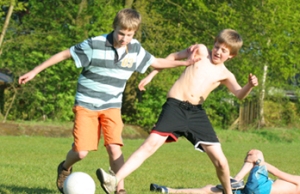Most people diagnosed with asthma will experience asthma symptoms when exercising. In addition, about 11 percent of the U.S. population who are not diagnosed with asthma will experience asthma symptoms, but only during exercise, a condition called
exercise-induced asthma .
The exercise-induced asthma is different from the typical asthma that is triggered by allergens or irritants, or both. Some people have both types of asthma, while others only experience exercise-induced asthma .
Asthma is a chronic inflammatory lung disease leads to three airway problems: obstruction, inflammation and hyper-responsiveness. Unfortunately, not yet known underlying cause of asthma.
How does exercise cause asthma symptoms?
When we breathe normally, the air entering the airways is heated and moistened by the nasal passages to prevent injury to the delicate lining of the airways. However, in some people with asthma, the airways may be extremely sensitive to allergens, irritants, infection, weather or exercise, or more of them. When they begin the symptoms of asthma, the muscles of the airways constrict and narrow, the lining of the airways begins to swell, and mucus production may increase.
When exercising (especially outside in cold weather),
the increase in the amount of air into and out of the mouth can cause the airways to cool and dry, which may irritate and cause the onset of symptoms of asthma . In addition, when breathing through the mouth during exercise, a person can
inhale more particles in the air, including pollen, which can trigger asthma.
What are the symptoms of exercise-induced asthma
The exercise-induced asthma is characterized by symptoms of asthma such as
coughing, wheezing and tightness in the chest of five to 20 minutes after starting exercise. The exercise-induced asthma can also include symptoms such as
unusual fatigue and feeling
-of-breath while exercising.
However,
exercise should not be avoided because of asthma . In fact, exercise is very beneficial for a person with asthma, improving their airway function by strengthening their breathing muscles. Ask your doctor for more information.
